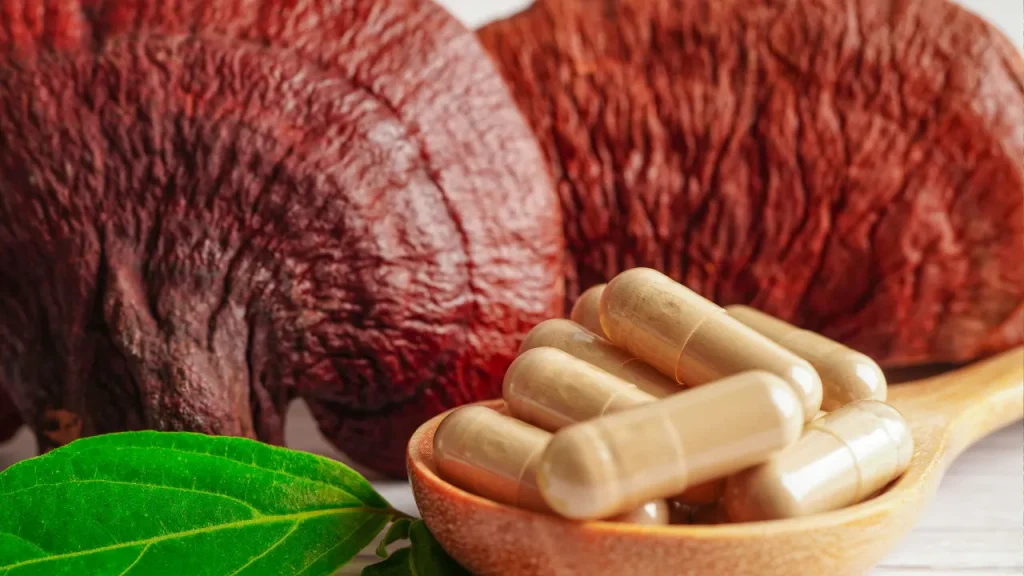Aiding Your Recovery From Irritable Bowel Syndrome: The Best Mushroom for Inflammation
Irritable Bowel Syndrome (IBS) is a prevalent gastrointestinal disorder that afflicts millions of individuals worldwide, causing a multitude of uncomfortable and often agonizing symptoms. The far-reaching impact of IBS on an individual’s quality of life cannot be understated. While a definitive cure for IBS remains elusive, there exists a diverse spectrum of treatment avenues designed to mitigate its distressing symptoms and offer much-needed relief. Within this landscape of therapeutic possibilities, one promising and intriguing pathway involves the utilization of mushrooms, with particular attention given to a specific variety renowned for its potent anti-inflammatory properties.
Throughout this article, we shall embark on a comprehensive exploration of Irritable Bowel Syndrome, delving deep into its root causes, the array of symptoms it manifests, the potential prognosis for those affected, and the spectrum of treatment modalities available. However, our focal point of investigation will be the captivating realm of mushrooms and their potential as a complementary approach to managing the often debilitating symptoms of IBS. In particular, we shall cast a spotlight on a mushroom variety celebrated for its remarkable anti-inflammatory attributes, seeking to discern whether it might indeed be the best mushroom for addressing the inflammation frequently associated with this complex syndrome.
You May Also Like:
Five Great Benefits of Turkey Tail Mushroom Capsules
Finding the Best Chaga Mushroom Supplement: 5 Top Brands Reviewed
Aiding Your Recovery From Irritable Bowel Syndrome: The Best Mushroom for Inflammation is an original (MushroomMaestro) article.
Best mushroom for inflammation:
Understanding IBS
Irritable Bowel Syndrome (IBS) is a functional gastrointestinal disorder, meaning that it primarily disrupts the normal functioning of the digestive system without being rooted in structural abnormalities. The precise causative factors of IBS continue to elude scientific comprehension. Nevertheless, several contributory elements are thought to play pivotal roles in the development of this enigmatic syndrome:
- Abnormal Gastrointestinal Motility: A prevailing theory in the realm of IBS etiology postulates that irregular contractions of the intestinal muscles may be a central instigator. These atypical muscular movements can engender discomfort and provoke alterations in bowel habits, hallmarks of the syndrome’s presentation.
- Gut-Brain Axis Dysfunction: Emerging research is increasingly shedding light on the intricate interplay between the gut and the brain in the context of IBS. Stress and emotional factors are now recognized as potent triggers or exacerbators of IBS symptoms. The intricate communication between the gastrointestinal system and the brain underscores the significance of mental health in managing IBS.
- Bacterial Overgrowth: Another contributing factor to IBS symptoms may be an overabundance of specific bacteria in the small intestine. This overgrowth can precipitate a constellation of IBS-related complaints, including bloating and diarrhea. Unraveling the complex dynamics of gut flora remains a crucial avenue of investigation.
- Food Sensitivities: A subset of individuals grappling with IBS may harbor sensitivities to particular foods, such as dairy, gluten, or artificial sweeteners. Consumption of these trigger substances can provoke a cascade of symptoms, reinforcing the intricate relationship between diet and IBS symptomatology.
- Inflammation: Chronic low-level inflammation within the gastrointestinal tract is another facet of IBS etiology. This persistent inflammatory state is often correlated with abdominal pain and discomfort, further substantiating the multifaceted nature of the condition.
While these factors collectively contribute to our understanding of IBS causation, it is vital to acknowledge that IBS remains a complex and highly individualized syndrome. As such, a holistic approach to its management encompasses an array of strategies that consider the unique interplay of these causal elements in each affected individual.

Best mushroom for inflammation:
IBS symptoms
Irritable Bowel Syndrome (IBS) presents a diverse array of symptoms that can fluctuate in intensity and duration, rendering it a challenging condition to diagnose and manage effectively. Among these multifaceted manifestations, several prevalent symptoms stand out as defining features of IBS:
- Abdominal Pain and Cramping: A hallmark of IBS, recurrent abdominal pain or discomfort is a pervasive symptom. This discomfort often waxes and wanes, with its intensity being influenced by bowel movements. The abdominal pain associated with IBS can be debilitating and profoundly impact an individual’s daily life.
- Bloating and Gas: Excessive bloating and gas are commonplace in the realm of IBS. This duo of discomfort can lead to not only physical distress but also alter an individual’s self-esteem and social interactions. Managing these symptoms is often a primary concern for those with IBS.
- Diarrhea and/or Constipation: IBS is a heterogeneous condition, manifesting in distinct subtypes. Some individuals predominantly experience diarrhea, categorized as IBS-D, characterized by frequent loose stools and urgency. In contrast, others grapple with constipation, classified as IBS-C, marked by infrequent and hard stools. Some may even navigate a mixed pattern known as IBS-M, which entails a fluctuation between diarrhea and constipation. These symptoms profoundly impact an individual’s daily life and may necessitate tailored management strategies.
- Changes in Bowel Habits: IBS can precipitate marked alterations in an individual’s usual bowel habits. The frequency and consistency of bowel movements may vacillate unpredictably, further adding to the uncertainty and discomfort that individuals with IBS encounter.
- Mucus in Stools: In certain instances, individuals afflicted by IBS may observe the presence of mucus in their stools. This occurrence can be disconcerting and is regarded as a potential indicator of the syndrome. The observation of mucus-laden stools underscores the intricate and multifaceted nature of IBS symptomatology.
It is imperative to appreciate that IBS symptom presentation is highly individualized, with the severity and combination of symptoms varying from one person to another. This inherent variability necessitates a personalized approach to diagnosis and treatment, one that acknowledges and addresses the unique constellation of symptoms that each individual with IBS may experience.
Best mushroom for inflammation:
IBS prognosis and treatment
Irritable Bowel Syndrome (IBS) is a chronic condition that significantly impacts the lives of those affected. Importantly, IBS does not cause permanent intestinal damage or increase the risk of colorectal cancer. However, its persistent presence can profoundly affect an individual’s quality of life and emotional well-being. The prognosis for IBS varies widely, ranging from intermittent symptom relief to the ongoing management of persistent symptoms.
Effectively managing IBS often requires a multifaceted approach that includes lifestyle adjustments, dietary changes, and medical interventions. Dietary modifications, such as identifying and avoiding trigger foods, play a central role in symptom management. For instance, adhering to a low-FODMAP diet, which restricts fermentable carbohydrates, can be a constructive way to alleviate symptoms.
Additionally, soluble fiber supplements like psyllium aid in regulating bowel movements and reducing discomfort. Probiotics, supplements containing beneficial bacteria, are favored by some people with IBS for rebalancing the gut microbiome and potentially improving digestive health. Medications tailored to an individual’s predominant symptoms may include antispasmodics, laxatives, or anti-diarrheal drugs. Stress management techniques like mindfulness, yoga, and meditation are crucial, as stress often exacerbates IBS symptoms. Furthermore, cognitive-behavioral therapy (CBT) serves as a potent tool for individuals dealing with stress-related symptoms, empowering them to develop effective coping strategies and cultivate a healthier relationship with stress.
To navigate the complex landscape of IBS treatment successfully, a personalized and patient-centric approach is essential, recognizing the unique symptom patterns and needs of each individual. Collaboration between the affected individual and their healthcare provider is paramount, leading to the formulation of an optimal treatment plan that enhances quality of life and overall well-being when living with this enduring condition.

Best mushroom for inflammation:
Reishi mushrooms
Mushrooms, renowned for their nutritional value and potential health benefits, encompass a diverse realm of fungal wonders. Among them, the Reishi mushroom (Ganoderma lucidum), often hailed as the “king of mushrooms,” emerges as a compelling contender in the realm of health and wellness, especially for individuals grappling with conditions like Irritable Bowel Syndrome (IBS).
At the heart of Reishi’s appeal lies an impressive array of bioactive compounds. This includes polysaccharides, triterpenoids, and antioxidants, each celebrated for its anti-inflammatory prowess. These compounds orchestrate a harmonious symphony within the immune system, diminishing the flames of inflammation. This tantalizing attribute raises the prospect of relief for individuals burdened with conditions characterized by chronic inflammation, including the elusive and often unpredictable landscape of IBS.
While Reishi does not profess to be a panacea for IBS, it extends a helping hand to those grappling with the complexities of this gastrointestinal syndrome:
1. Anti-Inflammatory Effects: At the core of IBS often lies chronic inflammation, a pervasive source of abdominal pain and discomfort. Here, Reishi’s anti-inflammatory prowess unfurls a ray of hope, potentially mitigating these symptoms and offering some reprieve.
2. Immune System Modulation: The complex interplay between IBS and the immune system becomes more comprehensible in the presence of Reishi. By tempering the immune response within the gut, Reishi may contribute to reducing hypersensitivity and quelling inflammation, fundamental components of IBS symptomatology.
3. Stress Reduction: Stress often acts as a catalyst for IBS symptoms. Reishi, armed with adaptogenic properties, equips the body to better withstand the pressures of stress, thereby potentially aiding individuals whose IBS symptoms are intricately intertwined with stress triggers.
4. Balancing Gut Microbiota: Within the complex realm of the gut, Reishi could play a role in promoting balance. Evidence suggests its potential to foster a more harmonious equilibrium among gut bacteria, possibly bolstering digestion and overall gut health. This, in turn, could alleviate various IBS-related issues.
Incorporating Reishi mushrooms into an IBS management plan under the counsel of a trusted healthcare professional ushers in a holistic approach to symptom relief. Although not a solitary remedy, Reishi emerges as a worthy companion in the quest to navigate the intricate terrain of IBS, providing a potential avenue to improve the quality of life for those embracing its therapeutic benefits.
Best mushroom for inflammation:
Healthy Truth Organic Go Shrooms
Healthy Truth Organic Go Shrooms offers a convenient way to harness the advantages of Reishi mushrooms in your comprehensive IBS management strategy. This exceptional product serves as a dependable source of concentrated and standardized Reishi extract, ensuring consistent and potent delivery of the mushroom’s valuable compounds.
Organic Go Shrooms presents a valuable gateway to access Reishi’s array of therapeutic properties, which encompass anti-inflammatory, immune-modulating, and stress-reducing attributes. These qualities hold particular promise for individuals grappling with the intricate challenges posed by IBS.
It’s essential to emphasize that Healthy Truth Organic Go Shrooms, like Reishi mushrooms themselves, should not be viewed as standalone solutions for IBS. Instead, they emerge as valuable allies in conjunction with conventional treatments and lifestyle adjustments. By embracing Healthy Truth Organic Go Shrooms as a complementary layer of support, you have the potential to elevate your IBS symptom management while delving deeper into addressing the potential root causes of this complex condition.
Navigating the multifaceted terrain of IBS requires a collaborative effort, ideally alongside a healthcare professional. Together, you can craft a personalized treatment plan that takes into account the unique amalgamation of therapies, dietary modifications, and supplements (such as Healthy Truth Organic Go Shrooms) precisely tailored to your individual needs and symptomatology.

Best mushroom for inflammation:
Final thoughts
Irritable Bowel Syndrome (IBS) presents a formidable challenge to those who grapple with its diverse and often distressing symptoms. Nevertheless, a wealth of strategies and treatments stands ready to empower individuals in their quest for effective symptom management and improved quality of life.
From the pivotal role of dietary adjustments to the calming embrace of stress management techniques, and from the precision of medications to the potential benefits of supplements like Reishi mushroom-based products such as Healthy Truth Organic Go Shrooms, those managing IBS are bestowed with an array of options to tailor their approach.
It’s crucial to remember that IBS is a profoundly individualized condition, with symptomatology and needs varying from person to person. The key to successful management lies in close collaboration with a healthcare provider, who can help devise a personalized treatment plan attuned to your unique circumstances.
Incorporating Reishi mushrooms into your IBS management plan, guided by the expertise of a healthcare professional, may provide an added layer of relief from inflammation and its related symptoms. While Reishi mushrooms do not offer a cure, their potential – validated by scientific research – renders them a worthwhile consideration for those who seek holistic avenues to improve their experience with Irritable Bowel Syndrome.
In closing, remember that you are not alone in this endeavor, and a wealth of resources and support systems exist to guide you toward a brighter and more comfortable future in your journey with IBS.

Further Reading:
American Journal of Nursing: Irritable Bowel Syndrome: A review
Canadian Medical Associal Journal: An approach to the care of patients with irritable bowel syndrome
Frontiers in Pharmacology: Nutraceuticals in the Modulation of the Intestinal Microbiota: Current Status and Future Directions
International Journal of Molecular Science: A Critical Review on Health Promoting Benefits of Edible Mushrooms through Gut Microbiota
Woods, C: This mushroom might alter gut bacteria for the better, study finds
Important Note: The information contained in this article is for general informational purposes only, and should not be construed as health or medical advice, nor is it intended to diagnose, prevent, treat, or cure any disease or health condition. Before embarking on any diet, fitness regimen, or program of nutritional supplementation, it is advisable to consult your healthcare professional in order to determine its safety and probable efficacy in terms of your individual state of health.
Regarding Nutritional Supplements Or Other Non-Prescription Health Products: If any nutritional supplements or other non-prescription health products are mentioned in the foregoing article, any claims or statements made about them have not been evaluated by the U.S. Food and Drug Administration, and such nutritional supplements or other health products are not intended to diagnose, treat, cure, or prevent any disease.
